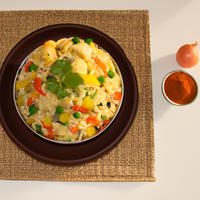
1 serving (150 grams) contains 200 calories, 5.0 grams of protein, 6.0 grams of fat, and 30.0 grams of carbohydrates.

Log this food in SnapCalorie

Nutrition Information
Calories |
317.5 | ||
|---|---|---|---|
% Daily Value* |
|||
| Total Fat | 9.5 g | 12% | |
| Saturated Fat | 1.6 g | 8% | |
| Polyunsaturated Fat | 0 g | ||
| Cholesterol | 0 mg | 0% | |
| Sodium | 476.2 mg | 20% | |
| Total Carbohydrates | 47.6 g | 17% | |
| Dietary Fiber | 6.3 g | 22% | |
| Sugars | 4.8 g | ||
| protein | 7.9 g | 15% | |
| Vitamin D | 0 mcg | 0% | |
| Calcium | 63.5 mg | 4% | |
| Iron | 2.4 mg | 13% | |
| Potassium | 238.1 mg | 5% | |
* Percent Daily Values are based on a 2,000 calorie diet. Your daily values may be higher or lower depending on your calorie needs.
Food Attributes
Source of Calories
About Vegetable upma
Vegetable Upma is a nutritious and flavorful dish from South Indian cuisine, traditionally enjoyed as a wholesome breakfast or snack. Made with semolina (rava), a coarse flour derived from durum wheat, it is lightly roasted and cooked with a medley of vibrant vegetables such as carrots, peas, beans, and spices like mustard seeds, curry leaves, and green chilies. The dish is prepared using minimal oil and seasoned with turmeric for its antioxidant properties, enhancing both the color and health benefits. Vegetable Upma is rich in dietary fiber, vitamins, and essential minerals due to the inclusion of vegetables, while semolina provides a good source of energy and protein. It is easy to digest and low in fat, making it a heart-healthy option. However, moderation is key for individuals sensitive to gluten or managing carbohydrate intake. A squeeze of lemon or garnish of coriander adds a refreshing touch to this balanced dish.



